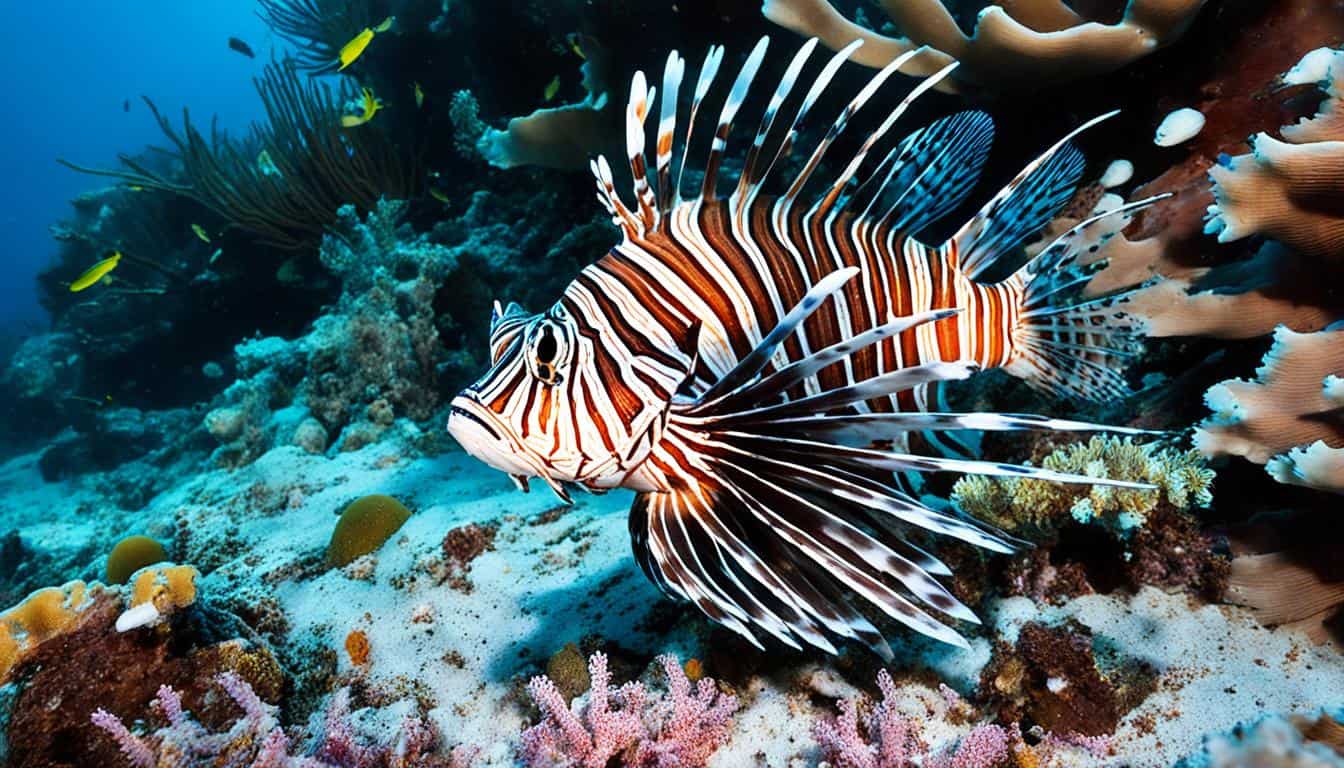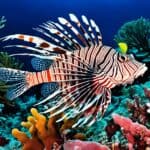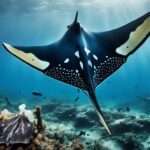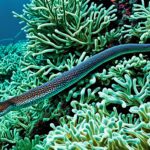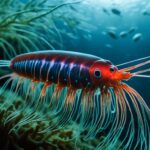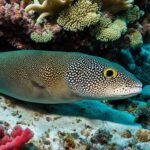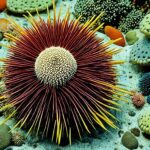Lionfish are now seen as a big problem for marine ecosystems, especially in the western North Atlantic. You might ask, how do lionfish affect marine ecosystems? They are an invasive species that harm biodiversity, mess up food chains, and damage coral reefs. They came from the Indo-Pacific and first showed up in Florida in the mid-1980s. Since then, they’ve spread a lot.
These fish don’t have many natural enemies in their new homes, so their numbers grow fast. The effect of lionfish goes beyond just their numbers. They cause big problems for native species and their homes. It’s important to understand how lionfish are changing marine ecosystems.
Overview of Lionfish as an Invasive Species
The lionfish is a big problem in the ocean, changing the way things work in marine ecosystems. Knowing how lionfish got there helps us understand the big picture of their impact. These fish have moved into new homes, affecting local species and places.
Background of the Lionfish Invasion
Lionfish first showed up off Florida in the mid-1980s. They quickly spread across the Atlantic, Gulf of Mexico, and Caribbean Sea. People accidentally and on purpose let them go from aquariums, making things tough for native sea life and changing the balance of the ecosystem.
Characteristics of Lionfish
Lionfish stand out with their bright red, brown, and white stripes. They usually grow 12 to 15 inches long, but some can get up to 18 inches in new homes. They can have babies every four days, which is a lot. They eat a lot of food, taking down over 70 different sea creatures, which puts a lot of stress on native species.
| Characteristic | Description |
|---|---|
| Habitat | Atlantic Ocean, Gulf of Mexico, Caribbean Sea |
| Size | Typically 12-15 inches, up to 18 inches |
| Reproduction | Can spawn every four days under optimal conditions |
| Prey Size | Can consume prey over half their body length |
| Target Species | Over 70 marine species |
How do lionfish impact marine ecosystems?
Lionfish change marine ecosystems in big ways. They affect native fish and coral reefs. It’s important to understand how lionfish invasion impacts marine life and the balance of the ocean.
Effects on Native Fish Populations
Lionfish are a big threat to native fish. They eat many types of fish and mess with the food chain. Research shows lionfish can cut native fish recruitment by up to 79%.
This big drop in fish numbers is bad for the area’s biodiversity. It also hurts fisheries that rely on these fish.
Impact on Coral Reef Health
Lionfish also hurt coral reefs. They make it harder for reefs to deal with problems like overfishing and pollution. By eating fish that eat algae, lionfish let algae grow too much.
This can cover corals and hurt reef health. It makes reefs less able to handle things like climate change.
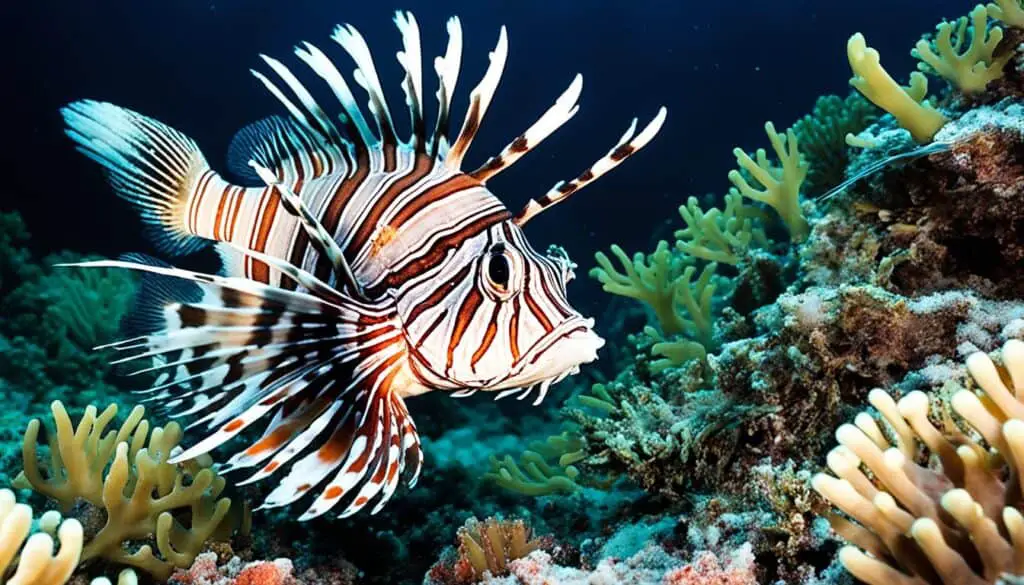
| Impact Category | Effects of Lionfish | Contributing Factors |
|---|---|---|
| Native Fish Populations | Reduced recruitment and diversity | Consumption by lionfish |
| Coral Reef Health | Increased algal growth significantly harms corals | Reduction of herbivorous fish |
| Fisheries | Threat to sustainability | Competition with native predators |
Understanding lionfish’s impact shows how they affect marine ecosystems. We need to act fast to protect our marine habitats from these invasive predators.
Ecological Implications of Lionfish Presence
Lionfish have invaded many marine ecosystems, causing big changes. They compete with native fish and change the balance of the ecosystem. It’s important to understand how this affects the environment.
Competition with Native Predators
Lionfish are strong predators that compete with native fish for food. This competition hurts the natural balance in the ocean. It leads to fewer fish in the area.
The lionfish eat a lot, making it hard for native species to survive. This affects their ability to reproduce and the variety of life in the ocean.
Alteration of Community Composition
Lionfish also change the types of fish in marine habitats. Studies show that lionfish make some fish species less common. This can lead to fewer different kinds of fish.
With fewer fish, there might be more algae on coral reefs. This can harm the reefs and make it hard for other sea creatures to live there.
Management and Control Efforts
Managing lionfish needs a team effort at local and national levels. Agencies, groups, and community members are key in controlling lionfish. They work together to lessen the harm these invasive species cause to marine life.
Local and National Initiatives
There are many ways to control lionfish. For example, NOAA’s Invasive Lionfish Web Portal teaches people about the risks of lionfish and how to remove them. National plans help coordinate responses across states and agencies. Local groups also play a big part by organizing lionfish derbies, where divers help remove lionfish.
Community Involvement and Support
Your help is crucial for managing lionfish. Supporting lionfish management raises awareness and encourages action. Joining in on removal events not only helps control lionfish but also brings people together for marine conservation. The efforts of citizens and groups can greatly improve lionfish control.
| Effort Type | Description | Involved Parties |
|---|---|---|
| National Initiatives | Coordinated plans to combat lionfish spread, including research and education. | NOAA, Federal Agencies |
| Local Removal Efforts | Community-based events aimed at reducing lionfish numbers through direct harvesting. | Local Organizations, Recreational Divers |
| Public Education | Programs to teach the public about lionfish and the need for population control. | Schools, Community Groups, NGOs |
The Future of Marine Ecosystems Facing Lionfish Invasion
The lionfish invasion is a big challenge for marine ecosystems today. These predators are taking over coral reefs, causing big problems. They are harming local fish populations, which leads to less biodiversity and big issues for native species.
The future of coral reefs and marine life is at risk. If we don’t act now, these ecosystems could be damaged beyond repair. We need new strategies like removing lionfish and teaching communities about the problem.
We also need more scientific research and your help to solve the lionfish problem. Working together, we can protect and fix marine ecosystems. This way, future generations can enjoy the beauty of our oceans and learn why we must stop lionfish from taking over.
FAQ
How do lionfish impact marine ecosystems?
Lionfish harm marine ecosystems, especially in the western North Atlantic. They outcompete native species for food and resources. This leads to fewer native species and changes community dynamics.
What are the effects of lionfish invasion on native fish populations?
Lionfish can reduce native fish recruitment by up to 79%. They prey on important herbivorous fish. This disrupts the balance of reef ecosystems, causing native fish populations to decline.
How do lionfish affect coral reefs?
Lionfish eat herbivorous fish, leading to more algae growth. This harms coral reefs. It threatens coral health and affects the relationships crucial for reef stability and biodiversity.
What are the ecological consequences of the lionfish invasion?
The lionfish invasion increases competition with native predators like groupers and snappers. This threatens important fisheries. It leads to an ecological imbalance and more stress on marine environments.
What management strategies are in place to control lionfish populations?
NOAA is working on strategies to manage lionfish, including education and public participation. Local groups also remove lionfish through derbies, encouraging divers to help control their numbers.
How can community involvement support lionfish management efforts?
Community involvement is key to managing lionfish. By participating in removal activities and supporting local efforts, the public can help reduce lionfish numbers. This protects native marine life.
What are the future implications for ecosystems facing lionfish invasions?
If we don’t act, lionfish could change marine ecosystems forever. Their growth threatens coral reefs and marine species. We need to work together to address these issues.

